Two important studies in this summary of current research on yoga and mental health demand special attention. I’m thrilled to report the outcome of a study that looks at trauma informed yoga as an intervention for treatment-resistant PTSD. I’m also pleased to analyze here why a gentle stretching intervention likely surprised the study authors when it was shown to be more effective than a restorative yoga practice for a group suffering from a metabolic syndrome caused by stress. There’s also a report on a study demonstrating yoga’s effectiveness for pain that indicates actual brain changes, and good news for yoga in the schools.
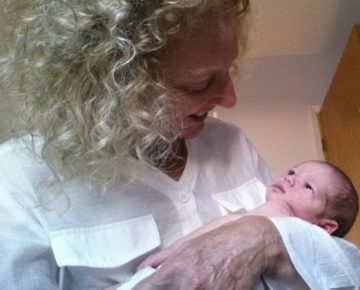 On a personal note, as a new grandma, currently serving the needs of my beloved daughter and her daughter in Montreal, I have had the opportunity to practice yoga in smaller doses than usual and at stranger times. My morning practice, my sleep schedule, my dining times and diet have all been challenged by the arrival of baby Shoshana. What a gift this has been to retreat for five weeks of deep connection, observing the love shining in my daughter’s eyes for her new baby. It touches me deeply that she waited so long to become a much better mother than I was able to be to her.
On a personal note, as a new grandma, currently serving the needs of my beloved daughter and her daughter in Montreal, I have had the opportunity to practice yoga in smaller doses than usual and at stranger times. My morning practice, my sleep schedule, my dining times and diet have all been challenged by the arrival of baby Shoshana. What a gift this has been to retreat for five weeks of deep connection, observing the love shining in my daughter’s eyes for her new baby. It touches me deeply that she waited so long to become a much better mother than I was able to be to her.
Also in this newsletter is a review of Mussar Yoga, by guest reviewer, Alana Gest, and notifications of upcoming LifeForce Yoga workshops where I will be teaching in Ohio, North Carolina and at Kripalu Center.
Read below for Amy’s thoughts on the life and death of Robin Williams and B.K.S. Iyengar.
The big news is that you can take a portion of our LifeForce Yoga Practitioner Training as an on-demand webinar series. The series fulfills the prerequisite workshop for the LifeForce Yoga Practitioner Training.
News: Portion of the LifeForce Yoga Practitioner Training now available as on-demand webinar series!
Due to the success of our live webinar series, we have launched a new on-demand webinar that serves as a portion of the LifeForce Yoga Practitioner Training. The course can also be taken as a refresher for previously certified LFYP’s, and as an introduction course to LifeForce Yoga. The course is open to all! To learn more about the webinar series visit our Online Training page. Once you have registered, you will receive a welcome packet with instructions on how to begin this self-paced course!
Research: Yoga Effective for Women with treatment resistant PTSD
Although “Yoga as an adjunctive treatment for posttraumatic stress disorder: a randomized controlled trial,” the title of the recent article published in the Journal of Clinical Psychiatry modestly gives the impression that the authors demonstrate that yoga is an effective treatment when combined with psychotherapy, the study results show something much more exciting. The Brookline Trauma Center, including yogi David Emerson, co-author of Trauma Sensitive Yoga, compared ten weeks of a one hour weekly trauma informed yoga class to a weekly one-hour women’s education and support group.
The primary outcome measure given to the 64 female participants was the Clinician-Administered PTSD Scale (CAPS). At the end of the study, 16 of 31 participants (52%) in the yoga group no longer met criteria for PTSD compared to 6 of 29 (21%) in the control group. Both groups exhibited significant decreases in PTSD symptoms during the first half of treatment, but these improvements were maintained in the yoga group, while the control group relapsed after its initial improvement.
The authors conclude that yoga significantly reduced PTSD symptoms comparable to well-researched psychotherapeutic and psychopharmacologic approaches. “Yoga,” says the authors, “may improve the functioning of traumatized individuals by helping them to tolerate physical and sensory experiences associated with fear and helplessness and to increase emotional awareness and affect tolerance.”
Research: Best Practice for Stress May Not be Restorative Yoga
Severe stress can cause metabolic abnormalities where cortisol levels (the fight or flight hormone) is chronically elevated. The authors of this large randomized controlled trial, recently published in Psychoneuroendocrinology, compared restorative yoga vs. gentle stretching and found that at 6 months, the stretching group had decreased cortisol at waking and bedtime compared to the restorative yoga group. The pattern of changes in stress mirrored this improvement, with the stretching group showing reductions in chronic stress severity and perseverative thoughts about their stress. The authors found significant decreases in salivary cortisol, chronic stress severity, and stress perception in the stretching group compared to the restorative yoga group.
The outcome of this study substantiates the approach of meeting the mood. In our work with people suffering from elevated stress and anxiety, we have found that gentle repetitive movement and mildly stimulating breathing at the beginning of the yoga session has a tension-releasing and mind-focusing effect. Anxious students and clients feel calmer after a mildly stimulating LifeForce Yoga practice, whereas they feel more agitated and uncomfortable if they adopt a restorative pose too soon in the session. This may seem counterintuitive, but in fact, people with anxious mood seem to do best with a practice that burns off a little steam (rajasic energy) before they slow down. This study indicates that beginning with a more active practice might better serve you and your students if anxiety is present.
Research: Good News for Yoga-based School Programs
A study, recently published in the Journal of Applied School Psychology used TLS (Transformative Life Skills), a dynamic or movement-based mindfulness practice that consists of yoga postures, breath regulation, and meditation. The study, “Effectiveness of a School-Based Yoga Program on Adolescent Mental Health Stress Coping Strategies, and Attitudes Toward Violence: Findings from a High-Risk Sample,” was led by Jennifer L. Frank, PhD, at the Prevention Research Center at Pennsylvania State University. Participants included 49 students attending an alternative education school in an urban inner-city school district. Results indicated that students who participated in the Transformative Life Skills program demonstrated significant reductions in anxiety, depression, and global psychological distress. Significant reductions in rumination, intrusive thoughts, physical arousal, and emotional arousal were reported as well. The results of this study are highly significant. Dr. Frank said, “A particularly important finding of relevance to this population was the strong and significant reductions we found in youth report of revenge motivation and hostility.”
Although this program is yoga based, by naming it TLS, the developers, headed by Bidyut Bose at Niroga Institute in Oakland, California, seem to have avoided the backlash from some groups who object to yoga on religious grounds.
The article is available online: http://www.tandfonline.com/doi/full/10.1080/15377903.2013.863259.
Research: Yoga shown to increase brain-derived neurotophic factor (BDNF)
In a randomized controlled trial published in Evidence Based Complementary and Alternative Medicine, the study’s authors compared levels of back pain, flexibility, serotonin levels and BDNF levels in women with chronic low back pain after 12 weeks of yoga, 3 times per week with those in a control group. After the 12-week intervention, as compared to the control group, pain went down in the yoga group, flexibility went up, BDNF was elevated and serotonin remained the same. (Serotonin went down in the control group, as did BDNF).
This is significant, not only because the premenopausal women who practiced yoga felt better, but because elevating BDNF is a clear indicator of positive brain changes, including telomere growth, which speaks to increased neuroplasticity. This brain change may be responsible for an increased ability in the yoga group to tolerate discomfort.
Review: Mussar Yoga by Dr. Edith Brotman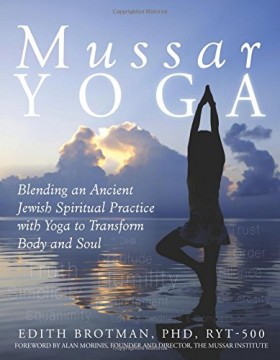
Reviewed by Alena Gerst, LCSW, RYT, LFYP-1. Alena blends her training as a licensed clinical social worker and yoga teacher in hospitals and in private practice. She completed therapeutic yoga training at Beth Israel Medical Center’s Department of Integrative Medicine, and is a certified LifeForce Yoga Practitioner Level 1. She provides outpatient psychotherapy for women with disabilities at NYU Langone Medical Center/Hospital for Joint Diseases, and is the author of A Wellness Handbook for the Performing Artist: The Performer’s Essential Guide to Staying Healthy in Body, Mind, and Spirit (Balboa Press, Hay House). Her yoga practice is inspired by the teachings of B.K.S. Iyengar. She lives in New York City.
In Mussar Yoga, Dr. Edith Brotman, founder of Kavvanah/Mussar Yoga, shares her belief in the transformative powers of yoga combined with the Jewish teachings of Mussar
I initially settled in to read Mussar Yoga as I do most other books, at the end of the day, as a way to relax and unwind. I wasn’t past the first page of the introduction before I was hunting for a pen to underline text. More time passed and I realized I had only read the first several paragraphs, as Brotman wastes no time in inspiring her readers (students) to read less, ponder more.
While yoga has become a common and well-known practice around the world, Mussar (pronounced moos-AHR), is a little known tradition, even among Jewish communities. Brotman introduces Mussar by letting the reader briefly into her own life as a woman whose Jewish experience has largely involved communal traditions and collective ritual.
In Judaism, Mussar is the Jewish practice of self-study, “a Jewish form of ethical self-inquiry,” addressing the needs and potential of the individual. For Brotman, a devoted yoga teacher, the study of Mussar was the missing piece to her otherwise communal experience of Judaism. A practice of blending intelligence and heart through the contemplation of thirteen traits outlined in Mussar became a means of profound self-examination.
Brotman writes of Mussar teachers over the centuries developing meditations, visualizations and chanting practices, but a discipline involving the body is nowhere to be found in the teachings. In Mussar Yoga, she deftly connects the two practices as a bridge between the physical and spiritual work of yoga, and the self-reflection of Mussar.
Brotman breaks down the practice of Mussar yoga into a thirteen chapter journey, each of which includes a physical yoga practice, written exercises, readings, and deep contemplation surrounding each of the thirteen traits in Mussar. The teachings of each full week is devoted to the following traits: Truth, courage, humility, order, non-judgement, zeal, simplicity, equanimity, generosity, silence, gratitude, loving-kindness, and trust.
While Brotman carefully outlines each asana (pose) used in Mussar yoga, including pictures and thorough instructions for alignment, she recommends readers have at least a beginner level of experience practicing yoga. She also encourages readers to consider embarking on the Mussar yoga path either alone or with a group, as there are benefits and drawbacks to both.
Mussar Yoga is not just for yogis, or people of the Jewish faith. The book is a thoughtful, engaging, and deeply spiritual guide for anyone who is looking to live a more fulfilling life. This practice requires courage, humility, and patience. I cannot imagine a better teacher to introduce the marriage of these two ancient paths to self-inquiry through the teachings of Mussar yoga than Edith Brotman, in this very inspiring book. Click here to purchase a copy of Mussar Yoga.
In Memoriam: Robin Williams and Iyengar – Legacies of Joy
The world has recently lost two bearers of light—actor Robin Williams, age 63, and yoga master B.K.S. Iyengar, age 95. Both men dedicated their lives to raising the level of joy in the world – their lives, deaths, and lasting effect on the world reflect that. But they did it differently.
Robin Williams brought us laughter, a way to cope with our disappointments, as well as to survive his own. But outside of public appearance, he sadly did not have a way to seize and find joy in the day. Iyengar offered not only himself, but the world, a way to face our most difficult days.
We all have ways of self-medicating—soothing ourselves when the anxiety becomes intolerable, or simply bringing balance to a system that has become imbalanced. According to what we’ve been reading in the media, Robin Williams self-medicated with substances that numbed the pain of living in his world. But his healthier self-medication was the art of performing. In the moments when he could see himself reflected in the happiness he brought to others, when he was totally absorbed in the role he was playing, he was immune to the darker patterns of his thoughts and beliefs. And as his audience, we too could forget our bleak moods or our victim story in the moments he entertained us. When we laughed with him or at his antics, we were enraptured in moments of joy that no grief or shame could penetrate. But when the performance was over, boom. He was back in his own dark spiral of thoughts and emotions. And so were we.
The yoga practice that Mr. Iyengar introduced to the West showed us another way out of our pain, a way to self-medicate that did not end when the laughter died off. He showed us that by clearing our inner space physically, emotionally and mentally through a yoga practice, we could begin to sustain balance in our lives. Yoga is not a panacea for pain, but current research is showing its beneficial effect on mood and all manner of debilitating conditions. Yoga, especially a practice that includes attention to sensation and breath, teaches us how to live with what is arising, even when it’s painful.
Mr. Iyengar died at 95. Although I was never his student, I did study with several teachers who were. And I had the great privilege of sitting on stage with him at a conference in India when he was 92, where he spoke with a thrilling vitality and an astonishing compassion for his younger self.
Whether we practice Iyengar Yoga or our practice is culled from other traditions or schools, we offer gratitude to Mr. Iyengar, who, through his commitment to teach fine teachers, offered us a way to find and sustain the joy through our daily practice. And we offer gratitude to Robin Williams who not only made us laugh but has also shone light on the devastating effects of depression. May more people seek treatment for their depression and may that treatment include yoga.
For LifeForce Yoga practices to cope with depression and anxiety, click here.
To find a LifeForce Yoga Practitioner in your area click here.
Upcoming Events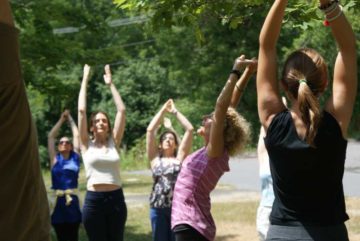
Body-Mind Over Mood: Empowering Self-Regulation with LifeForce Yoga
September 19-21st
Asheville Yoga Center – Asheville, NC
October 10-12th
Yoga on High – Columbus, OH
LifeForce Yoga to Manage Your Mood
September 26-28th
Kripalu Center – Stockbridge, MA
October 17-19th
Yogaville – Buckingham, VA
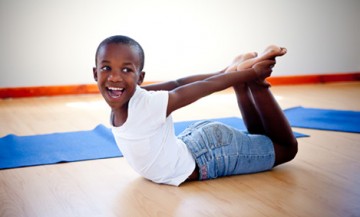

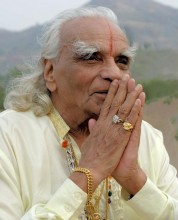
Warm congratulations on your grandaughter’s entry into life -I can feel your exhiliration! And thanks Amy for another informative newsletter and for your thoughtful words on Robin Williams and Mr Iyengar. I was not able to click on the links at the end though.